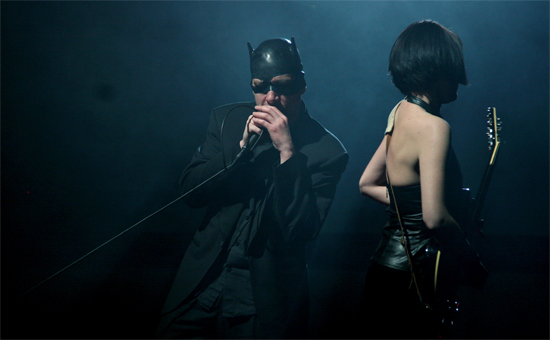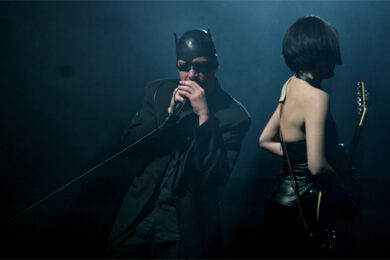There are two Cocoons in France. One is a duo from Clermont-Ferrand that plays sunny, soporific indie folk. The other is the rather more tenebrous solo project of Christophe Demarthe, who also co-founded Cold Wave/Industrial group Clair Obscur right at the start of the 80s.
"I like the confusion between the two French Cocoons," he says. "Once I was even invited on a national TV show. I answered that I feared I was the wrong Cocoon, the dark side of the force of Cocoon, the Cocoon they would perhaps meet if they went out at night in Paris in some peculiar places…"
Like its two predecessors (an untitled debut and 2005’s Violent Days Are To Come), new album III is an essay in atmospheric techno-minimalism, made using "my favourite plug-ins and these broken loops that populate a lot of my work." III is, if anything, even more pared-down than previous work but also sounds more cavernous, almost sepulchral, thanks partly to the interspersion of free-floating, nebulous pieces with more pulse-driven tracks. Demarthe describes it as an "aquatic and sort of sacred sound, linked to the circumstances of its gestation and a certain state of mind I was in."
These circumstances were varied, with the music originating in theatre productions, TV commissions and installations.
"I’m lazy, I wait for things to come to me, I don’t force them. Except when I’m commissioned to do something, obviously. That was the case with Edward Bond’s ‘The Children’. ‘The Children’ is a beautiful text by Edward Bond in which a child kills another child inadvertently, while carrying out a crime out of obedience to his mother. Bruno Lajara staged the play with a group of children aged between 11 and 16, from the Chemin Vert quarter in Boulogne-Sur-Mer, a ‘zone sensible’ (‘sensitive area’) as they say. What was interesting about this experience is that – contrary to my usual habits – I was writing as much based on my responses to the young actors as to the text. I was more interested in them than the theatrical production."
The music on this third album is largely drawn from the Bond play but Demarthe is keen to specify that "the tracks were reconfigured and reworked so that they would tell their own story. Other tracks were written and added to finish this 38-minute story."
So there are also pieces that were designed for a festival, Ososphère, in Strasbourg that was being curated by Demarthe’s label boss, Pierre Beloüin of Optical Sound. "He invited me to come up with a programme for a concert where the audience were sat in semi-darkness, facing several spinning dreamachines." (A dream machine is a strobing device invented by Ian Sommerville, an associate of William Burroughs.)
And there’s also ‘Meet’, a sweeping and more sentimental coda to the album. "I originally wrote it for a sci-fi TV film and [it] had been kicking around for a few years, forsaken like an orphan. It was originally written for a scene in a film where characters reunite. The mood of the scene recalled Godard in Nouvelle Vague, so I wrote a track almost as an ‘exercise de style’, doing some Godard-style music (or more in the style of Michel Legrand since, according to Legrand, he conceived and suggested the idea to Godard of using musical waves that arrive to blot out moments of dialogue between two characters). I thought that ‘Meet’, with its waves that wash over you, was a nice conclusion to the album after these other… how can I say?… more tormented tracks."
Demarthe is not the only member of an 80s Cold Wave or Industrial group to end up on Optical Sound – Norscq, aka Jean-Louis Morgère of The Grief, has also made it his home and mastered the first two Cocoon albums – and in many ways the label serves the legacy of that era much better than more obvious Cold Wave revivalists, preserving a spirit rather than a specific sound. Demarthe says "Optical Sound is, above all, the work of a visual artist, who is a big fan of music, of a certain type of music. It’s definitely a label but it’s also just as much an aspect of Pierre Beloüin’s artistic work. And the artists on the label have to be aware that they are part of this work. There are in some way subsumed into the ogre-ish vision of an insane artist-manager." In the 80s, though, Clair Obscur had little contact with their musical peers.
"We didn’t listen to French groups apart from Marquis de Sade and Orchestre Rouge. We listened to Joy Division, Tuxedo Moon, Durutti Column, The Virgin Prunes, DAF, The Talking Heads, Psychic TV, The Cure… We went to the New Rose record shop in Paris and Gérald, our favourite shop assistant, helped us to discover other groups that were in line with our tastes. He didn’t play us any French records (apart from maybe The Prophets). I didn’t meet Norscq until 2004, through Pierre Beloüin. It’s funny, there are a lot of French musicians from the Cold Wave/Industrial scene of the 1980s that I only met recently. We were quite insular in Clair Obscur. We sometimes went to clubs, like Rose Bonbon, Les Bains Douches, The Palace, but when we went out it was mostly to shut ourselves in our rehearsal rooms and play. It also sometimes happened that we would sometimes go on long treks to listen to a particular group, like the time we made a return trip from Paris to Cap Fréhel in Brittany to see Marquis de Sade and Orchestre Rouge in concert. We met some fishermen that were going to the concert before going out to sea, in terrible weather. We were still thinking of them when we returned to Paris at 5am when the market stalls were just being set up."
When I ask about artists who try to revisit the practices of that era, he says:
"What’s the point of that? An artist like Tricky on his Nearly God album is much closer to Psychic TV than any revivalist musician today. The last group I listened to with some interest was Liars. What Psychic TV, Tricky and Liars have in common is that they’re artists who explore, who experiment, who innovate. It’s the only thing that counts. With Clair Obscur, it was the only thing that mattered to us."
Philippe Petit also has at least one well-known compatriot namesake, the high-wire walker who crossed from one Twin Tower to the other in 1974. There’s also one who’s a jazz guitarist. The Philippe Petite I contacted was, like Demarthe, shaped by the punk era (he has spoken in other interviews about how music kept him alive in a period of substance abuse and negativity) but took a different route out of it, evangelising rather that making his own music.
"I never went to any music school and never played any instruments until a little over a year ago. Being a teenager I was listening to records all day long and really wanted to become part of the musical scenes, so I started presenting radio shows, doing ‘zines and then the Pandemonium and BiP_Hop labels. For many years I felt useful in the sense that tons of musicians existed but unfortunately not that many passionate folks were trying to help spread the word. Which is what I tried to achieve for years, though it had been since the early 80s that I was DJing and in the 2000s superimposing up to 8 sources to create a personal mix and using more and more field-recordings and vinyl-manipulations of mine instead of the music of others. In parallel I learnt to use software while developing the Strings Of Consciousness collective and thus, naturally, in 2008 I felt that I was ready to make some solo works public."
Collaborators on Petit’s Strings Of Consciousness project (which also has a new release this year) include such luminaries as Lydia Lunch, Barry Adamson, Scanner, Foetus and Cosy Fanni Tutti but his latest opus was entirely a solo project. Oneric Rings on Grey Velvet is the first part of a trilogy entitled Extraordinary Tales of a Lemon Girl. And it is quite an extraordinary thing, a sequence of eight "soundcrafted movements" that are both rich and unnervingly flat – rich because the arrangements are packed with attractive orchestral detail, pulling in suspenseful soundtrack tropes, Bernard Herrmann and lounge music but unnerving because the elements are all bitcrushed and processed in other ways so that they sound exaggeratedly artificial; there’s been no attempt at all to recreate a natural acoustic space, Oneric Rings revels in its own unreality. It’s as if the Lemon Girl of the title has descended into a digital underworld and a section like ‘No Escape from Her Heart’ is the theme to her encounter with a Mailer Daemon.
Petit maintains that none of this is done with sampling. "Everything was played whether acoustically or through my synth and then processed. I played many parts with my Roland Fantom G6 synth and then processed those so that I could find a sound being my own. Working at home and using headphones I tend to give more priority to the way details and dynamics interfere in such a context rather than if I were recording some players in a church, for instance."
Petit’s favourite description for himself is as a "musical travel agent." "I envision my music like soundtracks, and my purpose is to bring some potential listeners inside my own world and hopefully they can enjoy the travels." He doesn’t think the itinerary he’s proposing is a particularly arduous or unsettling one for the listener, though.
"Due to the fact that I have been listening to some strange musics since the late 70s I do not feel it to be unsettling. To me it is simply the way I like to hear it, and yes I attach importance to melodies and themes which you may label as "attractive". I am not interested in creating experimental music at all costs, I want to give some music which hopefully can be listened to repeatedly, revealing some details or new "richness" every time you decide to pay some attention to it."
For more from Rockfort, you can visit the official site here and follow them on Twitter here. To get in touch with them, email info@rockfort.info




